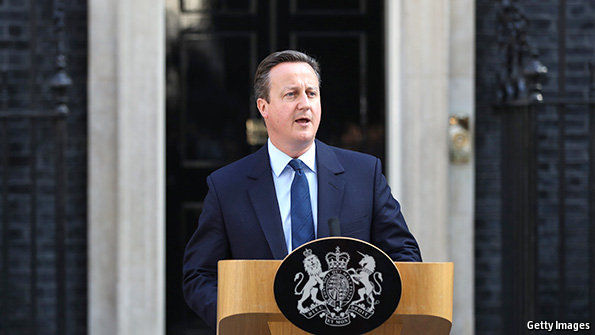Restoring Tradition, Authority in Britain
"Jo understood that rhetoric has consequences. When insecurity, fear and anger are used to light a fuse then an explosion is inevitable."
MP Stephen Kinnock
"Are we prepared to tell lies, to spread hate and xenophobia just to win a campaign? For me that's a step too far."
Baroness Sayeeda Warsi, former co-chair, Conservative Party
"I think wisely people would want to sit and look to see how it works for Britain. I doubt you'll see a groundswell of 'Britain's done it so let's do it too'. The Domino effect, which is what people are most focused on within Europe, wouldn't happen immediately. It would take some time, like all of the things around an exit vote would."
Bobby Duffy, managing director of social research, Ipsos Mori
"Even though there is diversity in opinion among the ten countries we surveyed, we found that support for the EU has generally been declining in key European countries over the last dozen years we have been tracking this."
"We see France is actually a country that has some of the most unfavourable views of the EU."
"Much of the disaffection with the EU among Europeans can be attributed to Brussels' handling of the refugee issue."
Jacob Poushter, senior researcher, Pew Research Center
 |
| Leave supporters celebrate the result in Sunderland after polling stations closed. Photograph: Toby Melville/Reuters |
And though it was thought that the "remain" side gained momentum after the horrible killing of "remain" stalwart MP Jo Cox, it likely did, but it was of a short-lived tenure. And her killer's voice although deplored -- the man a verifiable psychopath whose psychotic moment of rage took the life of a 41-year-old mother of two -- shouting "Britain first! Keep Britain independent! Britain always comes first!", made people recoil at the association, the sentiment resonated nonetheless.
Polls have proven lately, to be wrong as often as they have been right on the money. And though David Cameron's focus was on economics, urged as well by the Governor of the Bank of England, Mark Carney, it was of a lesser concern to those in Britain who have long viewed the dilution of their traditions and culture to an invasion that challenged religion and law, leading to an adverse reaction to continued immigration.
And while the presence of a million Poles who had migrated visa-less under the Schengen rule to find employment in Britain may have rankled, it was not so much as the EU-mandated 'fair share' of the flood of Muslim refugees and haven-seekers-after-economic-opportunities that motivated a lot of the "leave" support. Baroness Warsi who had her own arguments with the Conservatives over Gaza, swivelled from "leave" to "remain" in opposition to the immigration blowback.
 |
| David Cameron Quits Downing Street with a ruined legacy: “THE British people have voted to leave the European Union and their will must be respected.” |
Last month U.K. Ipsos Mori conducted a poll of people from Belgium, France, Germany, Hungary, Italy, Poland, Spain and Sweden for their views whether they might like their own country to hold a leave referendum and how they would respond. Italians and French wanted a referendum, Poles, understandably leaned pro-Europe; but overall 45 percent of respondents wished their country to hold a referendum; a third would vote to leave.
That doesn't reflect satisfaction on a wide scale with the European Union. "I think the theme from this is of a divided Europe", Ipsos Mori's managing director of social research stated. "It's not that big majorities of people in other European countries are clamouring for a vote or saying that they want to vote out. On the other hand, you've got significant proportions that actually want more European integration. So it's a real challenge for the EU if they have a very divided and varied population. There is no clear message", stated Bobby Duffy.
Almost half the people surveyed felt that Britain leaving the EU would have a "domino effect" right across Europe. Support for the EU is on the decline; a median of 42 percent of the ten countries surveyed felt a need to devolve some powers back to their own countries, a trend begun well before Britain's referendum. One that, had the EU read the signs positively and with a degree of sensitivity, might have led to a form of devolution being introduced to reduce some of that tension.
In 2004, 69 percent of French held a favourable view of the EU, as opposed to the present when a mere 38 percent do. As well, 94 percent of Greeks, 88 percent of Swedes and 77 percent of Italians disapprove of the European Union response to the problem of general disaffection. Professor of Politics at the Centre for Competition Policy, University of East Anglia, Hussein Kassim feels the EU should address the pressing issues of the eurozone and the migrant crisis.
"Those are enormous issues and so far there seems to be a lack of agreement on how to fix either of them, so those won't go away for a while."
Labels: Controversy, European Union, Great Britain, Immigration

<< Home